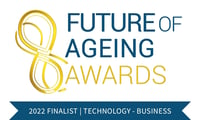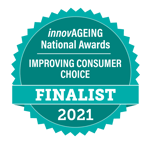The use of a clinical care planning software in residential aged care allows for an easy, quick and convenient way to record progress notes and access resident care plans at the point of care
The Aged Care Quality and Safety Commission (ACQSC) encourages care providers to plan, manage and monitor care using technology like clinical care planning software. Aside from that, they encourage care plans to be person-centred, accessible, legible and accurate, which is impossible with paper care plans.
Moving to a new way of working can be daunting when changing how you record and evidence care, especially when shifting from paper-based documentation to clinical care planning. However, there are many benefits for the residential care sector when it comes to clinical care planning.
Advantages of clinical care planning in residential care
The residential aged care industry is facing change; the encouragement of the use of technology and innovation when it comes to delivering quality care is growing.
Replacing traditional paper records with digital ones allows care providers to record care information digitally and at the point of care, bringing tremendous advances for care providers across Australia.
How does a clinical care planning software in residential care help care providers?
Implementing digital technologies like Clinical Care Planning software has many benefits:
- Saves care providers an hour a day
- Helps to minimise risks such as falls, nutrition and dehydration
- Records real-time information about the care that is being provided
- Makes it easier for care providers who use services to access their resident’s care records
- Helps providers and care staff to be aware when people’s needs change, enabling a quick response
- Helps to manage and support staff to do their job effectively and efficiently
- Offers the ability to use, view trends and analyse data to improve people’s care
- Enables care notes to be easily stored, requiring less physical space
- Helps information to be shared quickly, accurately and safely
- Supports better use of resources across the health and care system.
How does a clinical care planning software help residents?
- Allows care providers instant access to a person’s information, care needs and preferences, enabling them to provide responsive and person-centred care
- Reduces time spent on phone calls and writing reports to focus on spending time with residents and providing the best care environment
- Care providers can instantly share information with hospitals and external professionals via the Hospital Pack (electronic care information hospital pack) to give people the best quality of care at every stage of their health and residential care journey
- If the resident’s family member has a legal representative for care, they can sign their loved one’s care plan digitally without having a face-to-face meeting every month.
How does a clinical care planning software improve the standard of care?
Clinical care planning will dramatically improve the standard of care by:
- Improved safety in clinical care - providing a documented record that is always available to authorised care staff (nurses, carers, clinicians etc.)
- Reduced hospital admissions - health and care professionals have more information about the individual when making their professional decisions
- Improved data security and digital audit trail
- Access to residents’ information is available at any time, meaning care providers are better informed to deliver quality and optimal care
- Reduced phone calls and manual requests for resident’s information
- Increased resident information with an easy collection of data to support regulatory and funding requirements
Discover more about person-centred care plans here.











